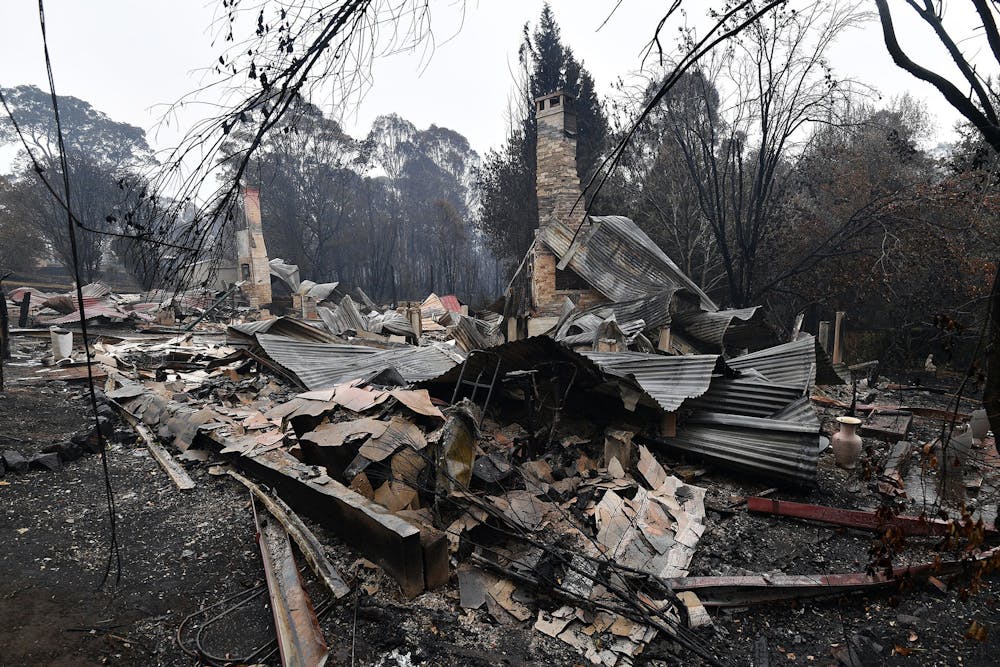We’ve all seen or read about the chilling scenes from Australia as the continent is ravaged by fires. In the middle of the day, the sky is a reddish haze, and drivers must use headlights to see in front them. The air is so thick with smoke that people cannot safely go outside for more than a few minutes. Families are forced to decide which of their valuables are worth keeping before they evacuate their homes.
As the climate rapidly becomes warmer, atypical meteorological phenomena become more common. The world’s climate is in flux as the ecosystem is thrown out of balance. The Australian tragedy is a glimpse into the future that awaits many areas around the world.
The massive brush fires began in December after Australia experienced weeks of record-breaking heat and drought. So far, the fires have burned through an area the size of West Virginia. Twenty-eight people have been killed and tens of thousands have had to evacuate. The blazes have killed half a billion animals, including thousands of koalas, and put endangered species at greater risk.
Here in the United States, California has been the victim of legendary wildfires, too.
In 2018, California faced the deadliest fire in its history. The Camp Fire in northern California killed 85 and displaced more than 50,000 people. In Los Angeles and Ventura Counties, the Woolsey fire displaced 200,000 and destroyed hundreds of buildings.
California’s recent history shows a disturbing trend. According to a study from California Gov. Gavin Newsom’s office, 15 of the 20 most destructive wildfires in the state’s history have occurred since 2000, and 10 of them happened in the last five years. Today, more than 25% of Californians (11 million people) live in “high fire-risk” areas.
The increase in wildfires has become a global trend .
According to the World Meteorological Association, there has been a 500% increase in the area burned by wildfires since 1970. A study from the National Research Council reports that for every degree of warming, the area of destruction caused by wildfires could potentially quadruple.
The situation is dire. We have already crossed the 1 degree Celsius mark. The 2015 Paris Climate Agreement has been one of the largest international efforts to combat climate change. The agreement, which Pres. Trump withdrew the U.S. from in November, set a goal of limiting warming to just 2 degrees Celsius by the end of the century. To United Nations scientists, however, 3 degrees Celsius is as optimistic as it gets. Based on the NRC’s numbers, even in the 3 degrees scenario we could see fires causing around 16 times the destruction we are seeing today.
The more pessimistic projections put us on track for 5 degrees of warming. That could result in fire damage more than 250 times worse than today.
It will take a massive effort to prevent this worst case. The recent history of climate change-fueled disasters should be a call to action for the world's governments and institutions. But major corporations control much of the world’s economy, and their primary function is profit-making over anything else.
Australia’s government still cozies up to fossil fuel interests that continue to unabashedly pollute the planet. The climate for debate is further poisoned by the fact that billionaire media mogul Rupert Murdoch, a powerful voice in climate denialism, owns 58% of Australian news circulation.
Here at home, much of the U.S. government still remains firmly under the control of corporations who are profiting from climate catastrophe. Even under President Barack Obama, fossil fuel subsidies exceeded the Pentagon budget in 2015. The Republican Party refuses to even acknowledge the climate crisis. In the so-called opposition, centrist Democrats only opt for minor, incremental action.
As Americans, we must organize to force the power centers in our country to take drastic action. In Bloomington, groups such as Students for a New Green World and Fridays For Future have taken local action to ensure public pressure for climate action, including class walkouts and protests. On a global level, we must choose the long-term interests of humanity over the short-term interests of profit-making.






